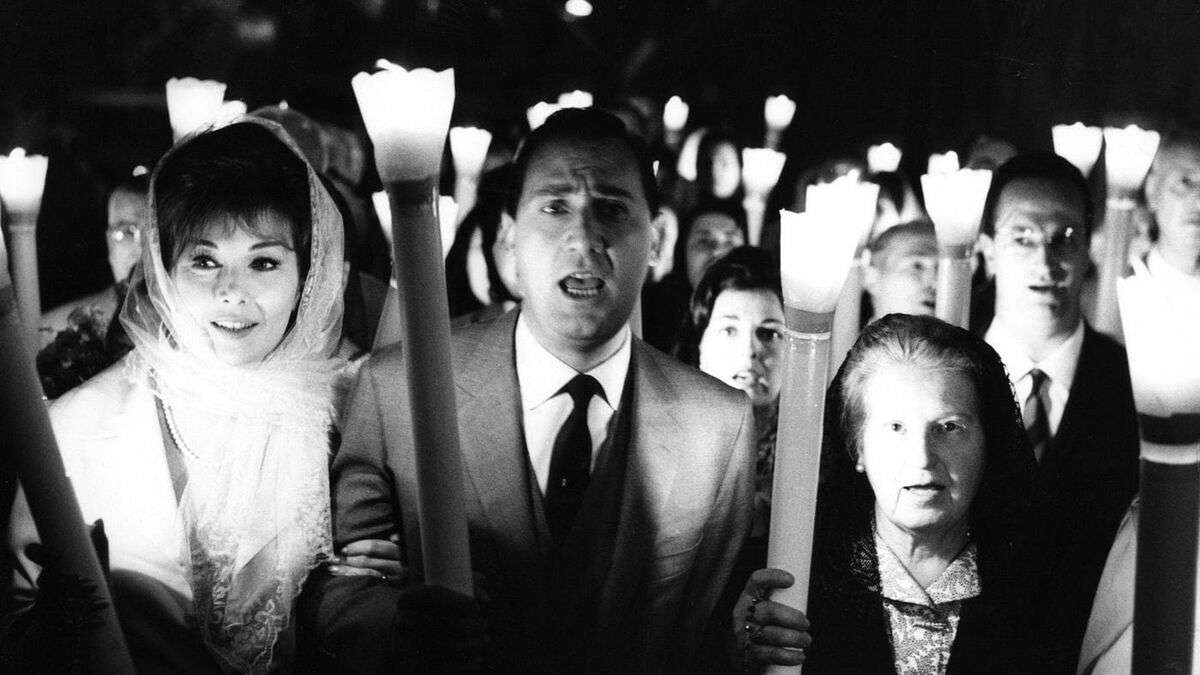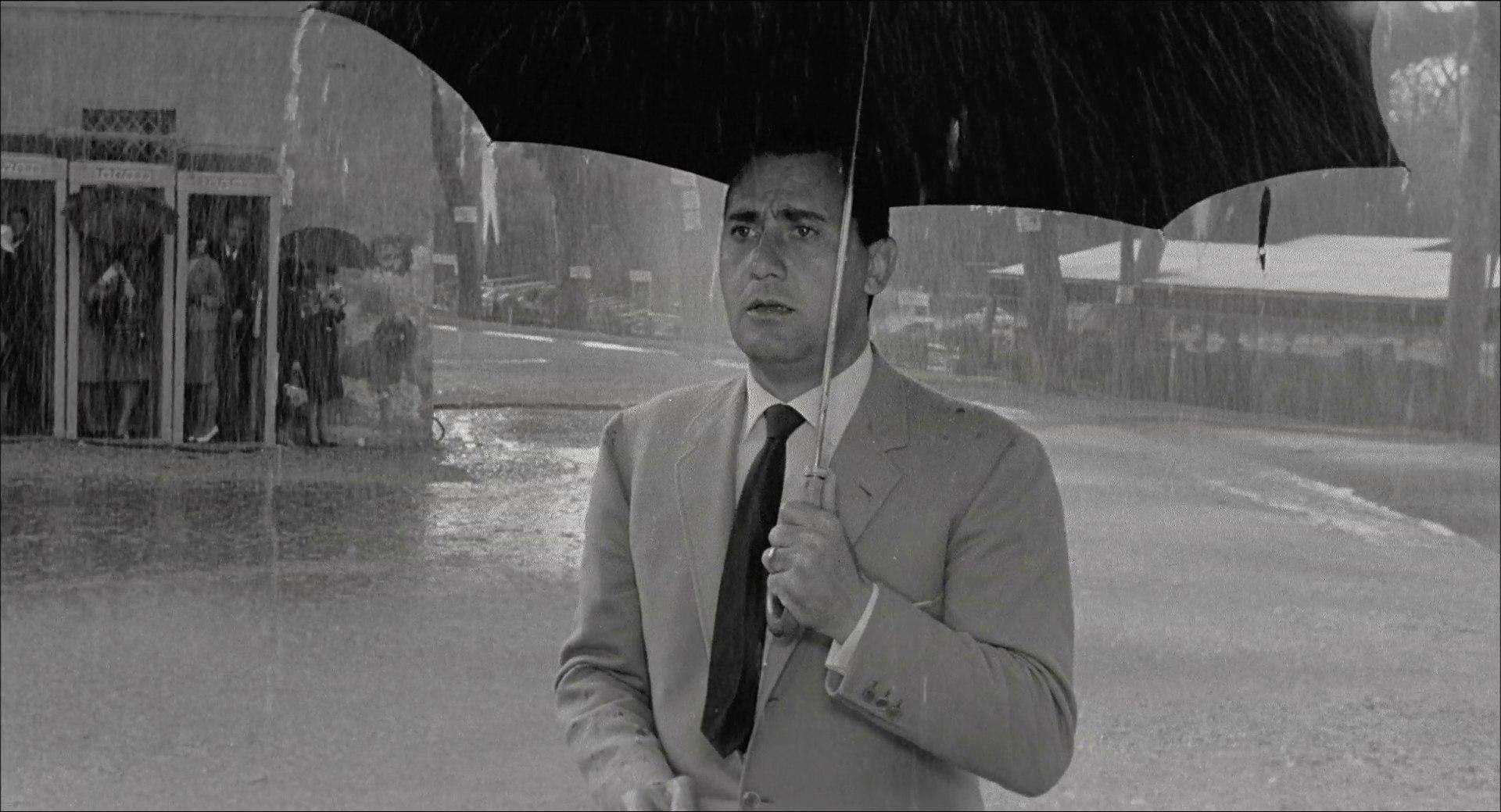In 1963, director Vittorio De Sica—the godfather of Italian neorealism—presented us with a cinematic masterpiece, no less remarkable than his earlier works like “Bicycle Thieves” (1948) and “Two Women” (1960). In fact, I would argue that “Il Boom” is, in many ways, a continuation of those two films. De Sica’s earlier works gave us a stark portrayal of the suffering endured by Italian citizens during and immediately after World War II. But with “Il Boom (The Boom, 1963),” he chose to shift his focus: to peel back the layers of post-war prosperity and expose the false promise of economic recovery that Italy supposedly enjoyed nearly two decades after the war’s end.
Unlike his earlier somber melodramas, De Sica opts for a more vibrant tone here, crafting a sharp and perfect black comedy. And black comedy is perhaps the most suitable vehicle for mocking a reality that is superficial and deceptive. Even the title “Il Boom” is deeply ironic: the term refers to the so-called “economic boom” that Italy experienced in the early 1960s. Hearing that phrase, one would expect the average Italian citizen to be thriving. But in the film, we see quite the opposite.
The film centers on Giovanni Alberti, a struggling entrepreneur from the middle class, striving to climb into the ranks of the wealthy elite. His ambition knows no bounds, yet it far exceeds his actual means. He is married to a wealthy woman—the daughter of a high-ranking Italian general—whose social status clearly surpasses his. From the outset, we learn that Giovanni is in a severe financial crisis and on the brink of bankruptcy. Still, he puts on a brave face for his wife, desperately trying to conceal the truth. He secretly approaches friends and acquaintances for loans to pay off his debts, but everyone, including his wife’s relatives, turns their backs on him.
At a social gathering, Giovanni unexpectedly encounters Mr. Bausetti, one of the wealthiest real estate developers in Italy and the owner of the loan office from which Giovanni has borrowed money. Giovanni sees an opportunity and tries to charm Bausetti—or even his wife—in hopes of pitching business ideas or at least stalling his bankruptcy. He fails to win Mr. Bausetti over, but to his surprise, Mrs. Bausetti shows interest and arranges a private meeting. Giovanni assumes she is romantically interested in him because he is younger than her husband. But the truth shocks him: she wants to buy his eye to replace her husband’s lost one, as Giovanni’s eye color is a perfect match.

Initially horrified, Giovanni refuses. But when he returns home to find that his wife has discovered the truth about his finances and left him, taking their infant child with her. Then, he succumbs to the pressure. He agrees to sell his left eye to the Bausettis. With the down payment, he clears his debts, wins back his wife and son, and throws a lavish party attended by all those who once rejected him. In a drunken outburst during the celebration, he exposes their hypocrisy, yet no one leaves—their assumption being that he is now fabulously wealthy. The next day, Giovanni heads to the hospital for the operation. Just before the surgery, he tries to escape, but Mrs. Bausetti corners him and coldly reminds him of the advance payment. The film ends with Giovanni surrendering to his fate, led passively to the operating room.
“Il Boom” is one of the strongest cinematic critiques of the capitalist wave that swept through Italy after the war. Unlike “Bicycle Thieves,” “Umberto D,” and “Two Women,” which depicted a war-ravaged Italy with bombed-out buildings, “Il Boom” features scenes of bustling construction—symbols of supposed renewal and prosperity. But these are merely a shiny veneer. Despite the availability of expensive American products and a real estate boom, the average citizen must borrow heavily to partake in this new lifestyle. Mr. Bausetti, representing capitalism, operates in both real estate and loans, profiting from both dreams and debt.
Giovanni, born into a modest family as shown by his mother’s humble home, is a classic example of someone seduced by the promise of upward mobility during the boom. Despite his hard work, he finds only debt and abandonment. His wife, uninterested in love or partnership, leaves him the moment she learns of his financial ruin, only to return once his debts are paid. One of the film’s most striking contrasts with De Sica’s earlier works is the disintegration of family ties in postwar prosperity. In “Bicycle Thieves,” the bond between father and son is movingly strong. In “Two Women,” the mother-daughter relationship is profound and resilient, forged in adversity. But in “Il Boom,” Giovanni’s infant son is almost completely absent, highlighting the emotional fragmentation of the modern family, even in times of peace and prosperity.
The symbolism of the eye in the film is rich: it represents the identity and dignity of the average Italian, which must be sacrificed to survive in the new era. Giovanni has already lost his money to Bausetti, but even that isn’t enough—the final price is his very body. Mr. Bausetti, too, is a potent symbol. He’s portrayed almost like a mythical beast—feared even by African mine workers who gave him terrifying nicknames. Yet, in the operating room, he trembles like a child, and it is Giovanni, the man losing his eye, who must console him. This reversal underscores the absurd cruelty of the system.

Three symbolic scenes stand out. The first is the religious procession after Giovanni’s wife returns. They light candles and walk barefoot in gratitude, seemingly joyful—everyone except Giovanni, who alone knows the price he must pay. This scene reflects Italy’s deep-rooted Catholic identity, despite its Christian Democratic Party leadership, real power often lay with military figures like Mussolini. The priest leading the ceremony is Giovanni’s father-in-law, the general, suggesting nothing has truly changed in Italy.
The second scene is the confrontation at the party, where Giovanni denounces the hypocrisy of the new Italian society. His parents are present but isolated, unable to blend in with the fake, nouveau-riche crowd. The third scene is Giovanni’s attempted escape from the hospital—a clear metaphor for the ordinary citizen’s futile attempt to break free from the trap of capitalism. He is cornered by the fearsome Mrs. Bausetti—more terrifying than her husband—and led away like a helpless victim. Traffic is stopped for his return to the hospital, as if his fate is a matter of bureaucratic routine: “Giovanni must sell his eye”—a destiny sealed with his first loan.
Finally, we must praise Alberto Sordi’s exceptional performance. Giovanni is the kind of character Sordi excelled at playing: the arrogant, ambitious man who thinks he’s a genius but continually fails. Yet here, Sordi adds a layer of melancholy that makes us sympathize with Giovanni, who simply loved a woman and dared to marry outside his social class. In the Italy of old, it would’ve been nearly impossible for a middle-class man to marry a general’s daughter. But in the era of “The Boom,” such things were suddenly possible. The real question becomes: how do you hold onto a marriage like that?







![Nervous Translation [2017] Review: The Cinematic Beauty of A Child’s Gaze](https://79468c92.delivery.rocketcdn.me/wp-content/uploads/2019/06/Nervous-Translation-860-thumb-860xauto-69102-768x430.jpg)
![The Phantom Carriage [1921] Review – A Startlingly Inventive Morality Play of the Silent Film Era](https://79468c92.delivery.rocketcdn.me/wp-content/uploads/2020/02/The-Phantom-Carriage-1921-768x559.jpg)